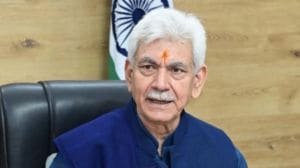Political number game in Goa again as HC scraps election of 2 BJP MLAs
In a judgment that could change the political arithmetic in Goa which is currently under Delhi’s rule, the Panaji bench of the Bombay H...

In a judgment that could change the political arithmetic in Goa which is currently under Delhi’s rule, the Panaji bench of the Bombay High Court today set aside the election of two BJP MLAs on the ground that they held ‘‘office of profit’’ during the May 2002 Assembly polls.
Justice N A Britto set aside the election of Rajendra Arlekar from Vasco—he is also the state BJP chief—and Dayanand Mandrekar from Siolim on petitions filed separately by two NCP men who contested the polls.
Today’s development leaves the BJP with 14 MLAs in the 40-member House. It also has the support of UGDP MLA Matanhy Saldanha.
On the other side, there are 17 MLAs: Congress has 15 while NCP and MGP have one each. Plus there’s independent MLA Philip Neri Rodrigues who was disqualified after he switched sides to the Congress and became Deputy Chief Minister.
Five seats are vacant and bypolls are to be held on June 2. All five seats were held by the BJP but the MLAs quit to contest afresh on Congress tickets. After today’s verdict, both sides are claiming they can form the government once the bypoll results are out.
BJP’s Manohar Parrikar said he was confident of forming the government with the help of the two disqualified MLAs. ‘‘We will win all five by-elections and the court has already stayed the disqualification by 30 days. So we can form the government once the results are out,’’ Parrikar said.
NCP’s Philip D’Souza had challenged Arlekar’s election, saying he was chairman of the Goa State ST and OBC Finance Corporation Ltd at the time of the election. According to D’Souza, Arlekar had appointed his supporters as employees of the corporation and made use of their services during the elections. He also said Arlekar had visited Australia at the expense of the corporation.
A similar petition against Mandrekar, who won the Siolim seat, was filed by NCP’s Chandrakant Chodankar who lost the polls. Chodankar approached the court, saying Mandrekar was chairman of the Goa Khadi and Village Industries Board at the time of his election.
The two petitions had been rejected on July 18, 2003 by the Panaji bench on technical grounds. The petitioners then approached the Supreme Court which sent the petition back to the Panaji bench earlier this year with the rider that a verdict be pronounced in four months.






- 01
- 02
- 03
- 04
- 05

























